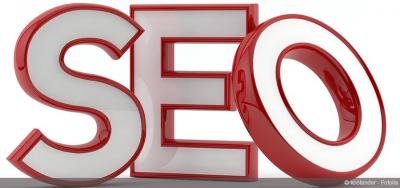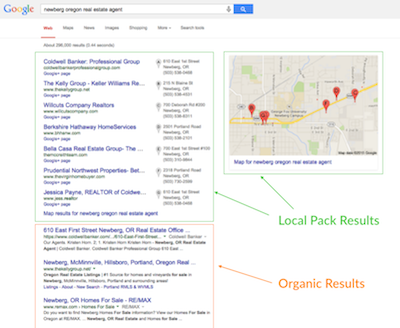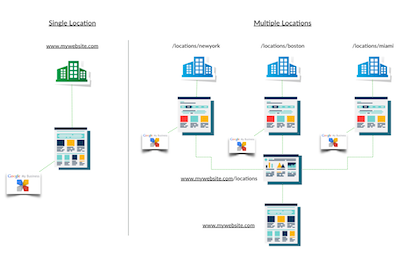You are viewing our site as an Agent, Switch Your View:
Agent | Broker Reset Filters to Default Back to ListMake Google Happy by Tackling Local SEO
June 04 2015
 Search engine optimization is complicated and tedious. The last thing you want to hear is that you need to do more of it.
Search engine optimization is complicated and tedious. The last thing you want to hear is that you need to do more of it.
But the fact is, local search is vital to your success as a real estate agent. According to the National Association of REALTORS®'s recent Digital House Hunt study, "69 percent of home shoppers who take action on a real estate brand website begin their research with a local term, i.e. 'Houston homes for sale,' on a search engine."
In other words, around seven out of 10 buyer leads that come from your website started with local search. Let's assume all real estate websites in your target area generated 1,000 leads last month. Of these 1,000 leads, 690 came from local searches. This breakdown from Search Engine Watch illustrates how a company's search ranking affects traffic: If your company ends up in the very first spot in someone's search results, you end up with 33 percent of the web traffic. The company beneath you gets around 18 percent of the traffic. The people in position no. 3 get 11 percent, and those who rank fourth tend to get 8 percent.
Based on our hypothetical scenario of 1,000 leads, if you don't rank in the top four positions, you potentially miss out on 483 local-search leads — nearly half of all potential website leads in your area.
Do I have your attention now?
Where You Show Up in Google
One particularly confusing local SEO concept is figuring out the end results of all your efforts. Here are the three main places businesses show up in local search results:
 1. Local Pack or Local Carousel. The local pack is the section of business listings that appear above the typical, organic listings. These sections usually contain seven business listings that include a business' name, address and phone number, with additional information available when hovered over. Here's how to appear in the local pack:
1. Local Pack or Local Carousel. The local pack is the section of business listings that appear above the typical, organic listings. These sections usually contain seven business listings that include a business' name, address and phone number, with additional information available when hovered over. Here's how to appear in the local pack:
- Own your Google My Business page.
- Optimize your Google My Business page.
- Build a location landing page on your website (more on this below)
2. Organic Search Results. This is likely what you think of when you visualize Google search results. The first page of searches reveals ten results and they often show up as website links, images, news sources, videos, social media posts, and social media profiles. If you want to show up in the local organic results:
- Optimize your website for specific local search keywords.
- Own a host of fresh, high-quality, and locally optimized content such as blogs, local resource pages, and MLS listings.
- If your business has multiple locations, create the proper website structure that reflects all target locations.
3. Google Maps Results. Many local searchers skip traditional search and go straight to Google Maps for information such as driving directions, reviews, business hours, and even coupons or specials. If you want to show up in Google Maps results:
- Have a Google My Business page.
- Accept walk-in customers, and post your business hours on Google My Business.
These recommendations represent the bare minimum you need to do to get Google's attention for ranking. If you're in a competitive market, I recommend you go above and beyond with your websites, social media, and Internet directory listings.
Google My Business Page Optimization
When I ask people about their Google Plus presence, I typically get a response similar to, "Isn't that dead, like MySpace?" or "Nobody is on there, right?"
Well here's a news flash for Google Plus haters: In 2014, Google merged Google Places and Google Plus into its new Google My Business platform. This means if you want to show up in Google's local pack search results, you must have a Google Plus page. It's no longer an advantage; it's required.
The information Google pulls from its users' social interactions proves incredibly valuable to its algorithm's accuracy. Google sees its duty as serving up the most accurate and valuable content on the web. The more social signals it has, the better it does its job. Google wants your information in the form of your My Business page, and in exchange you can receive reviews, share content, and give your customers the ability to interact with you.
So what's our key takeaway? Make sure you set up your My Business page completely and, more important, start using it. And this does mean use it just like you would Facebook or Twitter — post to it, comment on other people's content, and make connections. If you need help with setup and optimization, check out my video tutorial on how real estate agents and brokers can best optimize their Google My Business pages.
The Role of Social Media in Local SEO
Each time you +1 a webpage, like a Facebook post, or retweet a link, you essentially offer up your vote of confidence for this piece of content. The more "votes" the content gets, the more popular it appears to be. The more popular it appears, the higher the likelihood of other people finding it valuable as well.
Since search engines look to provide top-notch content, it's safe to assume creating popular content greatly benefits you and your business. Moreover, what better way is there to determine popularity than with each of those little votes of confidence? I won't tell you Google simply ranks your blog posts higher because you've earned 50 Facebook likes while your competitor amasses just 10; there is a whole lot more to it than that. But I will tell you Google strongly considers a difference in likes to be a contributing factor.
So how do you get social savvy? Engaging in social media, posting more on social channels, and building a larger following certainly helps. But the days of gaming search engines with keyword-stuffed domain names, bloated descriptions, and fluffed-up blog posts ended years ago. Today, Google simply desires valuable content. This means people actually need to like what you create if you want lasting SEO success. So next time you sit down to write a blog post, make sure it solves a real need for your audience.
Landing Page Optimization
 Google doesn't know the location of your target audience, nor does it know your website focuses on a specific city (or set of cities). You need to tell Google manually by setting up a location landing page and optimizing the rest of your site with local keywords and metadata.
Google doesn't know the location of your target audience, nor does it know your website focuses on a specific city (or set of cities). You need to tell Google manually by setting up a location landing page and optimizing the rest of your site with local keywords and metadata.
A location landing page is a specific page on your website that you optimize with local information. This tells Google where you intend to focus your local search efforts. This page should show your business information (business name, address, and phone number), as well as a map with driving directions. These features help tell Google a real business owns your website. For much more in-depth tips on proper setup, watch this landing page tutorial.
If you are a single-location operation, you can simply use your home page as a location landing page by optimizing it as mentioned above, then linking it to your Google My Business page. But it gets tricky if you own offices in multiple cities. If this is the case, it's important you have a separate location landing page for each office or branch as shown in the image below. Optimize each landing page as mentioned above, and each should also have a separate Google My Business profile. When setting up multiple locations for your business, use the My Business Locations manager to keep everything tidy.
Citations
Yellow Pages, Yelp, Foursquare, Superpages, and other directories are all popular search destinations. In order to have maximum exposure, you should claim listings on as many of these sites as possible. In local search language, these directory listings are called "citations."
Of course, getting found on Yelp isn't the only reason to have a Yelp listing; Google understands the importance of these websites as well. Having many citations around the web gives Google more information about your business, including the opportunity for more reviews — Google loves real-time customer feedback. Here are a few other tips and tricks:
- Stay consistent Your business name, address, and phone number must appear exactly the same on all citations across the web.
- There are a few tools to help you find, correct, and all your citations, such as MOZ Local, Brightlocal, and Whitespark.
- Make sure your business is listed on local directories (such as chamber of commerce websites or local Rotary International sites) and real estate–specific sites like the National Association of REALTORS®' directories page.
Your Success Lies in Your Value
No single silver bullet exists for local search marketing success. But the best way to rank higher in Google results is to become a valuable asset to Google's customers — who also happen to be your customers. Ask yourself, "Is my web presence valuable to customers? Are my blog posts helpful? Are my social media posts insightful or entertaining? Are all of my profiles accurate and well-branded?" Once you answer yes to these questions, you really can't go wrong.
To view the original article, visit REALTOR®Mag.









